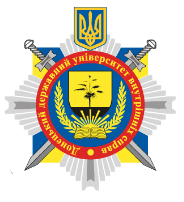THE RIGHT TO CONFIDENTIALITY OF CORRESPONDENCE IN UKRAINE: POLITICAL AND LEGAL DISCOURSE
DOI:
https://doi.org/10.32782/2709-9261-2023-2-6-1Keywords:
interference with human rights, secrecy of telephone conversations and correspondence, state policy, guarantees of legality of law enforcement agencies and special servicesAbstract
Today, Ukraine is a democratic and legal state where human rights and freedoms are protected by national legislation. However, the right to the secrecy of telephone conversations and correspondence is not sufficiently protected, taking into account the fact that audio recordings of telephone conversations of well-known politicians and public figures, which contain incriminating facts for them, often appear in the mass media. As a rule, the source of such records remains unknown at the official level. This limits the ability of interested parties to verify the legality of the origin of such materials. In the course of the study, it was established that Ukraine, despite its totalitarian past, confidently follows the European path of state building. The European Convention on the Protection of Rights and Fundamental Freedoms and the practice of the European Court of Human Rights had a particular impact on the state of protection of individual rights to privacy of telephone conversations and correspondence in Ukraine. The study illustrates that the change in the legal regulation of the state's activity regarding interference in the sphere of private life is connected with the fall of the totalitarian regime in the USSR and covered all Soviet republics without exception. Strong shifts in the direction of guaranteeing human rights in Ukraine have been observed since the time of its declaration of independence and began from the moment of adoption of the Law of Ukraine "On operational and investigative activity". The significant contribution of the Criminal Procedure Code of Ukraine (2012) to solving such problems is emphasized. At the same time, the work substantiates that, in fact, until recent times, the issue of legal regulation of the activities of state bodies in terms of interference in a person's private life was not sufficiently regulated. Norms of national legislation do not contain any safeguards that would enable a person against whom, prior to the initiation of criminal proceedings, measures to interfere with the secrecy of correspondence or the secrecy of telephone conversations were carried out, to receive information about the grounds and terms of their implementation, the directions and methods of storage and use of the obtained according to them the results, which is contrary to the practice of the ECHR, which interprets the peculiarities of the application of the norms of Art. 8 of the Convention. Today, there is not a single independent and competent body in Ukraine to which one could turn for the protection of their violated rights, mediated by the conduct of relevant operative-search or counter-intelligence measures against a person. The activities of law enforcement agencies and special services are subject to parliamentary control in the vast majority of European countries. The course of Ukraine to join the European Union determines the need for further convergence of national legislation with the legislation of European countries, including in the part of regulating the activities of law enforcement agencies and special services on interference with the rights of individuals to the secrecy of telephone conversations and correspondence. Focusing attention on this problem, the need to create a specially functioning body under the Verkhovna Rada of Ukraine is substantiated, which would be responsible for issues of control over the work of law enforcement agencies and special services, including the grounds for their interference in the privacy of telephone conversations and correspondence of individuals.
References
Бандурка О.М. Теорія і практика оперативно-розшукової діяльності : монографія. Харків : Золота миля, 2012. С. 620.
Бандурка О.М., Перепелиця М.М., Манжай О.В. Оперативно-розшукова компартивістика : монографія. Харків : Золота миля, 2013. С. 352.
Берназюк І.М. Захист права на повагу до приватного й сімейного життя у практиці Європейського суду з прав людини. Вчені записки ТНУ імені В.І. Вернадського. Серія «Юридичні науки». 2020. Том 31(70). № 4. С. 104–110.
Ємчук Л.В. Право на повагу до приватного життя в практиці Європейського суду з прав людини. Альманах міжнародного права. 2015. Випуск 8. С. 117–122.
Флурі Ф., Бадрак В. Демократичний цивільний контроль над сектором безпеки [Democratic civilian control over the security sector]. Центр дослідження армії, конверсії та роззброєння. Kиїв, 2016. 288 с. ISBN 978-617-7393-19-0
Конвенція про захист прав людини і основоположних свобод. URL: https://uk.wikipedia.org/wiki (дата звернення: 19.08.2023).
Конституція СРСР 1924 року. URL: https://uk.wikipedia.org/wiki (дата звернення: 19.08.2023).
Конституція СРСР 1936 року. URL: https://wikipedia.org/wiki (дата звернення: 19.08.2023).
Конституція СРСР 1977 року. URL: https://zakononline.com.ua/documents/show/169373___601884 (дата звернення: 19.08.2023).
Брежнєв Л.І. Матеріали Вікіпедії [Електронний ресурс]. URL: https://uk.wikipedia.org/wiki/Брежнєв/ Ілліч (дата звернення: 19.08.2023).
Основи кримінального судочинства Союзу РСР та радянських республік. URL: https://shieldandsword.mozohin.ru/documents/law16591.htm (дата звернення: 19.08.2023).
Закон СРСР «Про органи державної безпеки в СРСР». URL: http://shieldandsword.mozohin.ru/documents/law16591.htm (дата звернення: 19.08.2023).
Конституція Литви. URL: https://www.lrs.lt/home/Konstitucija/Konstitucija_RU.htm (дата звернення: 19.08.2023).
Конституція Туркменістану. URL: http://customs.gov.tm/ru/laws/konstitutsiya-turkmenistana (дата звернення: 19.08.2023).
Конституція України. URL: https://zakon.rada.gov.ua (дата звернення: 19.08.2023).
Практика таємного стеження за політичними діячами досі існує в Україні. https://helsinki.org.ua/articles/praktykatajemnoho-stezhennya-za-politychnymy-diyachamy-dosi-isnuje-v-ukrajini (дата звернення: 19.08.2023).
Постанова Кабінету Міністрів України № 1169 «Про затвердження Порядку отримання дозволу суду на здійснення заходів, які тимчасово обмежують права людини, та використання добутої інформації». URL: http://zakon.rada.gov.ua/laws/show (дата звернення: 19.08.2023).
Кримінальний процесуальний кодекс України. Відомості Верховної Ради України. 2013. № 9–10, № 11–12, № 13. Ст. 88.
Закон України «Про розвідку». URL: https://zakon.rada.gov.ua/laws/show/912-20#Text (дата звернення: 19.08.2023).
Закон України «Про контррозвідувальну діяльність» URL: https://zakon.rada.gov.ua/laws/show/374-15#Text (дата звернення: 19.08.2023).
Закон України «Про оперативно-розшукову діяльність». URL: https://zakon.rada.gov.ua/laws/show/2135-12#Text (дата звернення: 19.08.2023).
Парламентський контроль за діяльністю спеціальних служб: іноземний та національний досвід, висновки для України. URL: https://niss.gov.ua/news/statti/parlamentskiy-kontrol-za-diyalnistyu-specialnikh-sluzhb-inozemniy-tanacionalniy-dosvid (дата звернення: 19.08.2023).
Закон України «Про національну безпеку України». URL: https://zakon.rada.gov.ua/laws/show/2469-19#Text (дата звернення: 19.08.2023).





